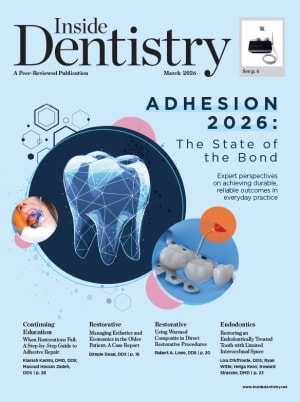Caen Contee
In an era in which artificial intelligence (AI) is redefining possibilities across all industries, its impact on dentistry stands out as particularly transformative. Beyond enhancing diagnostic accuracy, AI is revolutionizing all aspects of dental practices' business operations to drive efficiencies and cost savings.
Improving Business Operations
In addition to driving newfound marketing efficiencies, including written and multimedia content creation, AI is having profound effects on treatment acceptance rates and the lifetime value of patients. One such application involves the use of AI-powered planning software to show lifelike pretreatment images to educate patients as well as simulated images of the results that they could potentially achieve in different treatment scenarios. This technology allows dentists to create realistic simulations of many dental procedures, ranging from teeth whitening to orthodontics. By presenting these visualizations, dentists can help patients better understand the potential outcomes of procedures, significantly increasing their comfort and confidence. This approach not only aids in patient education but also boosts treatment acceptance because patients are more likely to opt for procedures when they can visualize the results.
AI can also be instrumental in customizing patient interactions. For example, AI algorithms can analyze patients' histories and preferences to recommend specific dental products or services. This could include suggesting a particular type of toothbrush or toothpaste based on the patient's oral health history or recommending a whitening treatment if the patient has previously expressed interest in cosmetic dentistry. More generally, AI can be integrated with dental practice management software to streamline appointment scheduling and follow-up care, ensuring a seamless and personalized patient journey from the initial consultation to the completion of posttreatment care.
AI's application in dental practices can even improve efficiency from a human resources perspective by offering competency-based assessments during the hiring process. AI agents can help evaluate candidates' technical skills, such as their proficiency in using specific dental equipment or software, which is crucial for operational efficiency in a dental office. Furthermore, AI agents can be used in the ongoing training and development of team members by identifying areas in which they may need additional training or to be updated on the latest dental technologies and procedures. This helps to ensure that the dental team remains competent and knowledgeable, which directly impacts the quality of care that is provided to patients.
Although AI's various roles in dental practices help enhance operational efficiency, overall, its incorporation is about elevating the entire dental care experience to make it more personalized, efficient, and aligned with patients' needs and expectations.
A Cost-Saving Ally
Regarding cost savings, AI-powered technology is making significant strides. For example, sophisticated algorithms are being used to predict practices' supply needs based on historical usage patterns. This predictive capability anticipates the need for required supplies and alerts providers to buy more before they run out, ensuring that practices maintain optimal inventory levels. In addition to ensuring that supplies are on hand, the integration of AI into supply chains and procurement models has been demonstrated to reduce dental supply costs by as much as 20%. By analyzing market trends and vendor pricing, AI systems can recommend where and when to buy supplies, helping dentists get the best deals available. This not only streamlines the purchasing process but also prevents scenarios involving overstocking or understocking, which can lead to unnecessary expenses.
Assuming that a dentist spends an average of $3,000 a month on dental supplies, a 20% cost reduction is substantial. Extrapolating this to the entire dental industry in the United States reveals a potential for savings that is staggering. Considering that there are approximately 200,000 practicing dentists in the United States, the total annual savings for the industry would be $1.44 billion. This figure highlights that AI doesn't just have the potential to increase revenues for individual practices; it can also have an immense economic impact on the entire dental industry and the medical field beyond.
The Future of AI in Dentistry
The integration of AI into dentistry is ushering in a new time of efficiency and cost-effectiveness. By harnessing the power of AI to improve both diagnostic accuracy and operational savings, dental practices can provide better patient care while also managing their expenses in a way that improves their profitability. As we look toward the future, the role of AI in dentistry is poised to expand even further and solidify its status as an indispensable tool in modern dental practice.
About the Author
Caen Contee is the founder and CEO of Wellplaece, a company that streamlines the purchasing of supplies for dental support organizations, group practices, and individual practices.
